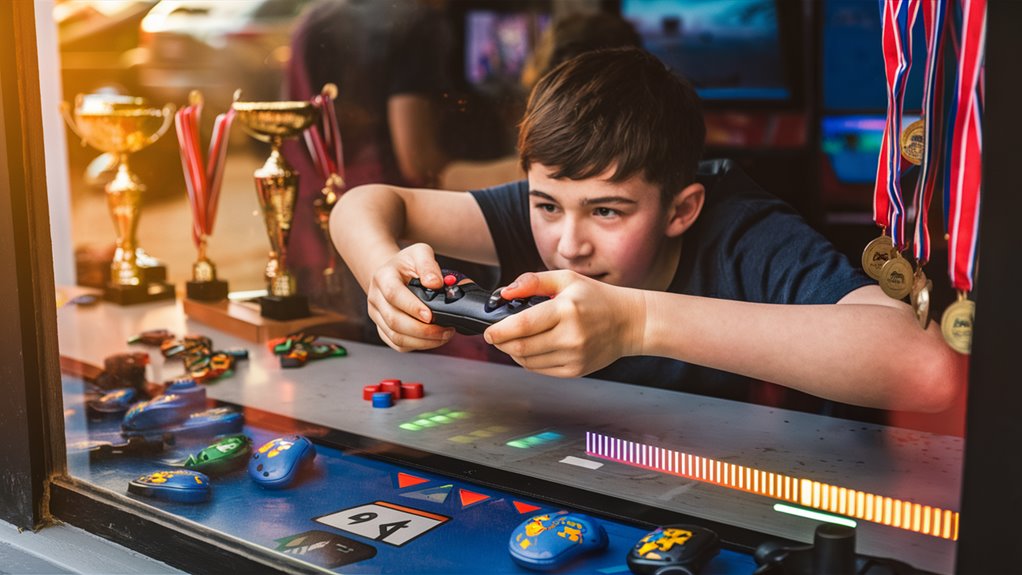Let’s talk about something interesting happening in gaming these days. You know how younger players seem to have different expectations from their games? Well, there’s been quite a shift in what gets them excited, and it’s pretty fascinating.
Think about it – remember when getting cool stuff in games was all about random luck? You’d open loot boxes hoping to get something amazing, kind of like playing the lottery. But today’s younger crowd? They’re just not buying into that anymore.
What really gets them going is seeing their skills pay off directly. It’s like the difference between winning at a slot machine versus winning a chess match, if you know what I mean. These players want to know that when they pull off an amazing move or master a tough technique, they’ll actually get something worthwhile for their effort.
And honestly, it makes total sense. Imagine spending hours practicing a complex game strategy, only to have your rewards determined by a random number generator. Pretty frustrating, right? That’s why we’re seeing more games introduce reward systems that actually track and recognize player skill.
But here’s the really interesting part – this isn’t just about wanting instant rewards. These younger gamers are looking for something deeper: real proof that they’re improving and getting better at what they do. It’s basically changing how we think about gaming achievements altogether.
So as competitive gaming keeps growing bigger and bigger, understanding this preference for skill-based rewards isn’t just helpful, it’s crucial. It tells us a lot about where gaming is headed and what tomorrow’s players will expect from their digital experiences.
The Rise of Competitive Gaming
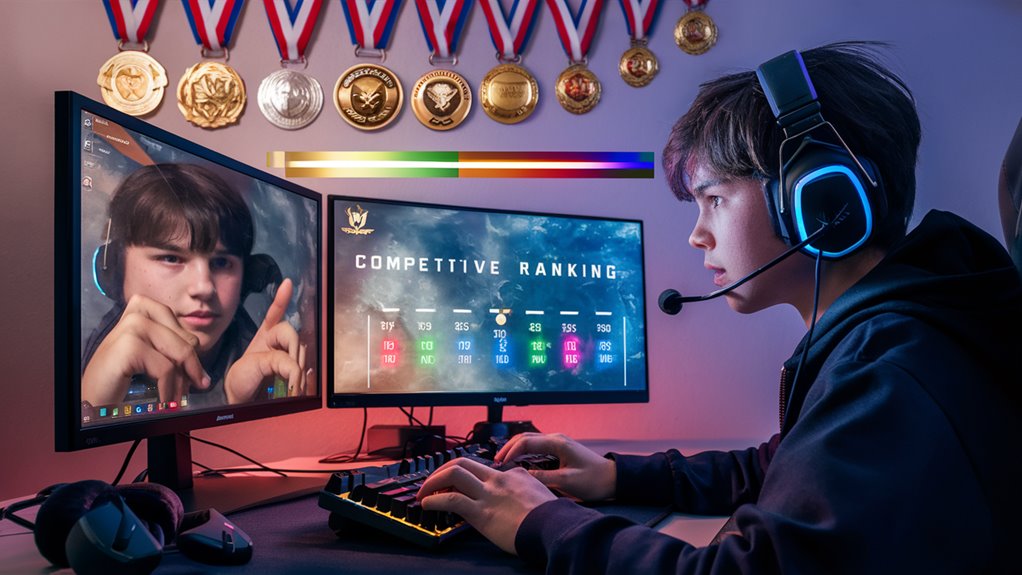
Think back to when gaming was just about beating your friend’s high score at the arcade. Well, competitive gaming has come a long way since then.
These days, millions of players around the globe are diving into esports tournaments and leagues, turning what was once a casual hobby into something much bigger. It’s pretty incredible how video gaming now offers serious prize money, professional teams, and dedicated streaming platforms where fans can watch their favorite players compete.
You know those popular games like League of Legends, Dota 2, and Counter-Strike? They’ve completely changed how we think about competitive gaming.
Each one has its own detailed ranking system that tracks every move you make, kind of like a digital sports scout. The cool thing is, you’re not just randomly matched anymore – these games figure out exactly how good you’re and pair you with players at your skill level. So when you improve, you can really feel yourself 사설사이트 climbing up those competitive ranks.
But here’s what’s really interesting: competitive gaming has transformed the whole culture around video games.
Gone are the days when gaming was just about having fun on your couch. Now you can watch pro matches just like you’d watch traditional sports, learn advanced strategies from coaching websites, and even follow your favorite players on social media.
Players these days want more than just participation trophies, they’re after real recognition for the time and effort they put into mastering their craft. And honestly, who can blame them? When you’ve spent countless hours perfecting your gameplay, you want something to show for it.
Social Media and Personal Achievement

Let’s talk about how social media has completely changed the way we view and share our personal achievements, especially in gaming. You know how it goes – you finally beat that impossible boss or hit a new rank, and what’s the first thing you want to do? Share it with the world, right?
These days, gaming achievements have become like digital trophies we proudly display on our virtual shelves. Whether it’s posting a victory screenshot on Instagram or sharing a clutch play clip on TikTok, our gaming wins have become part of who we’re online.
It’s pretty fascinating when you think about it.
Gaming platforms have caught onto this trend big time. Take Discord and Twitch, for instance. They’ve built entire features around sharing your gaming moments with friends and followers.
Remember when gaming achievements used to be just for bragging rights with your buddies? Now they’re building blocks of your online presence.
The really interesting part is how this creates a motivation loop. Picture this: you pull off an amazing play, share it online, and suddenly you’re getting likes and comments from people all over.
Pretty addictive, isn’t it? Game developers know this too, and they’re clever about it. They’re designing games with those picture-perfect, shareable moments in mind, knowing we’ll want to show them off to our followers.
It’s like they’re giving us the tools to become our own mini-content creators, one achievement at a time.
Transparent Progress Over Random Rewards

Let’s talk about how gaming has changed lately, especially when it comes to rewards. You know how frustrating it can be to rely on pure luck to get the items you want, right?
Well, younger players are getting tired of that whole random loot box thing and are gravitating toward games that show them exactly what they’re working toward.
Think about it like this – imagine training for a marathon where you have 도박사이트 이용주의사항 no idea how far you need to run to get your medal. Pretty discouraging, right?
That’s why newer games are laying out clear paths to success. When you boot up these games, you’ll see exactly what you need to do to unlock that awesome character skin or special weapon you’ve been eyeing.
The really cool thing is how this carries over into competitive gaming. It’s like having a detailed report card that shows exactly where you’re crushing it and where you need work.
No more wondering why you dropped in rank or what you need to focus on to climb higher. Everything’s right there in black and white.
Want to improve your gameplay? The system will tell you precisely what skills need polishing. Maybe your aim needs work, or perhaps your resource management could use some fine-tuning.
Instead of throwing money at random boxes and hoping for the best, you’re putting in the hours to actually get better at the game. And you know what? That feels way more satisfying than just getting lucky with a random drop.
Esports Impact on Gaming Culture
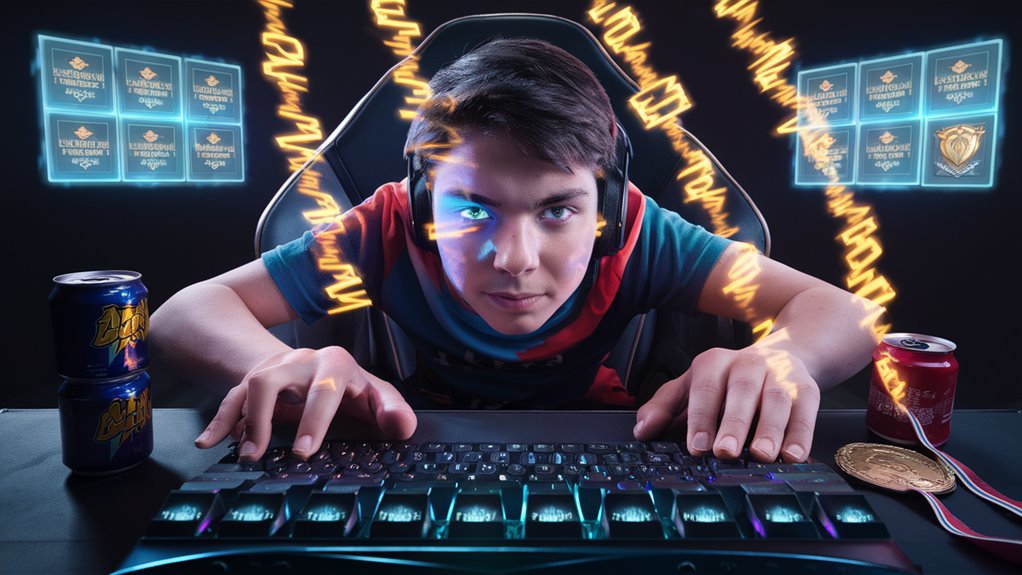
Let’s talk about how esports has completely changed the gaming landscape. What started as a fun way to pass time has transformed into something much bigger – a legitimate career path that’s reshaping how we think about gaming culture.
You know what’s fascinating? The way competitive gaming has pushed players to incredible new heights. These days, gamers aren’t just playing for fun; they’re mastering complex mechanics and strategies that can lead to serious rewards.
Think of it like traditional sports, where dedication and skill can open doors to professional opportunities.
Game developers have caught on to this trend, and it’s fascinating to see how they’ve adapted. They’re now designing games with competition in mind, kind of like architects building sports stadiums.
From sophisticated ranking systems to detailed replay features, everything’s geared toward helping players improve their game.
The coolest part? There’s now this whole ecosystem built around competitive gaming. Want to be a pro player? Go for it. Prefer coaching others? That’s an option too. Maybe streaming’s more your style? There’s definitely an audience for that.
Young players especially are drawn to this world, looking up to their favorite pros like kids once idolized traditional athletes.
But here’s what really gets me – gaming isn’t just about entertainment anymore. When you dive into competitive gaming, you’re actually picking up some serious life skills.
Team coordination, quick decision-making, performing under pressure – these are things that matter in the real world too. Pretty neat how playing games can teach us so much, right?
Generational Shift in Gaming Preferences

Let’s talk about how gaming preferences have changed across generations. You know how every generation has its own unique way of doing things? Well, gaming is no different, and the shift we’re seeing nowadays is pretty fascinating.
Modern gamers, especially those who grew up with competitive gaming, want something more than just playing for fun. Think about it – younger players have been raised in an era where showing off their skills actually means something.
They’re not just collecting points or finishing levels; they’re building real expertise that earns them respect in the gaming community.
Gone are the days when simply completing a level would unlock the next challenge. Today’s games are all about proving yourself. Take popular titles like Fortnite or Apex Legends, for instance.
These games don’t just hand out cool character skins or special items – you’ve got to earn them through genuine skill and dedication. It’s kind of like getting a black belt in martial arts; the reward shows everyone exactly what you’ve accomplished.
What’s really interesting is how this has changed game development. Developers now have to think carefully about creating reward systems that actually mean something.
They can’t just throw in some random achievements anymore. Players want sophisticated ranking systems that reflect their true abilities, matchmaking that puts them against equally skilled opponents, and rewards that actually show off their gaming prowess.
Monetization Through Skill Development
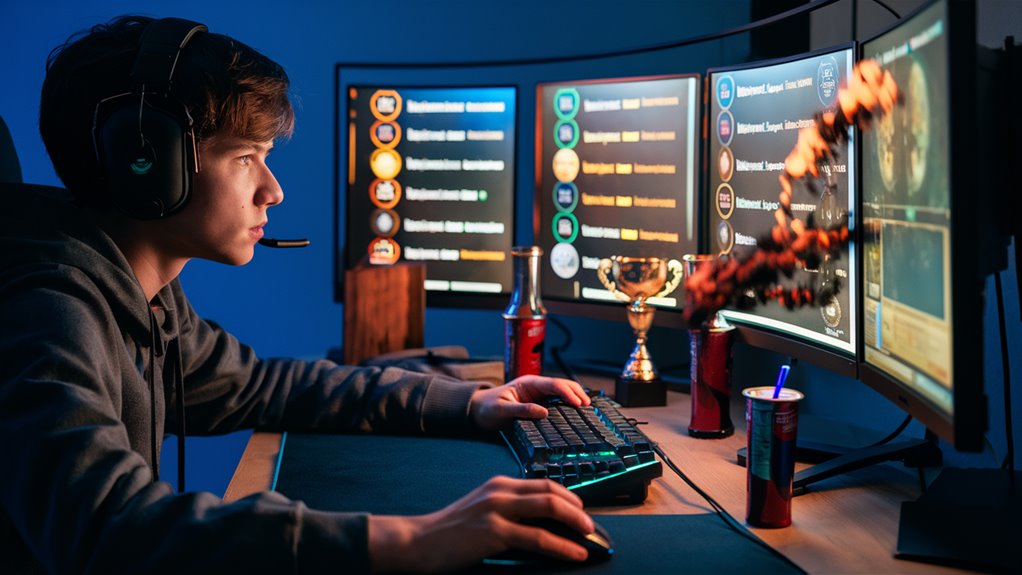
Let’s talk about how games are getting smarter about rewarding skilled players while making money. You know how it used to be – you’d just buy stuff in games and that was it. Well, things have changed quite a bit.
These days, game developers are giving players interesting choices. Take premium content, for instance.
You can either show off your gaming skills to unlock that shiny new character skin, or just buy it right away if you’re short on time. It’s pretty cool how you get to decide what works better for you.
Want to put your skills to the test? Many games now offer tournaments where your gaming prowess actually pays off.
Think of it like a virtual sports competition – the better you play, the more valuable stuff you can win. Sometimes it’s rare items, other times it’s special currency you can spend in the game store.
What I really find interesting is how games reward consistent skill development. Maybe you’ve noticed this too.
The more you improve, the more perks you unlock. It could be anything from special discounts in the store to exclusive items that only top players can get their hands on. This really makes you want to keep practicing and getting better, right?
And here’s the clever part – while you’re focused on improving your game, you might actually end up spending less money because you’re earning rewards through skill instead.
But for players who prefer a shortcut, the option to purchase is still there. Pretty smart way to keep everyone happy, if you ask me.
Player Agency and Control
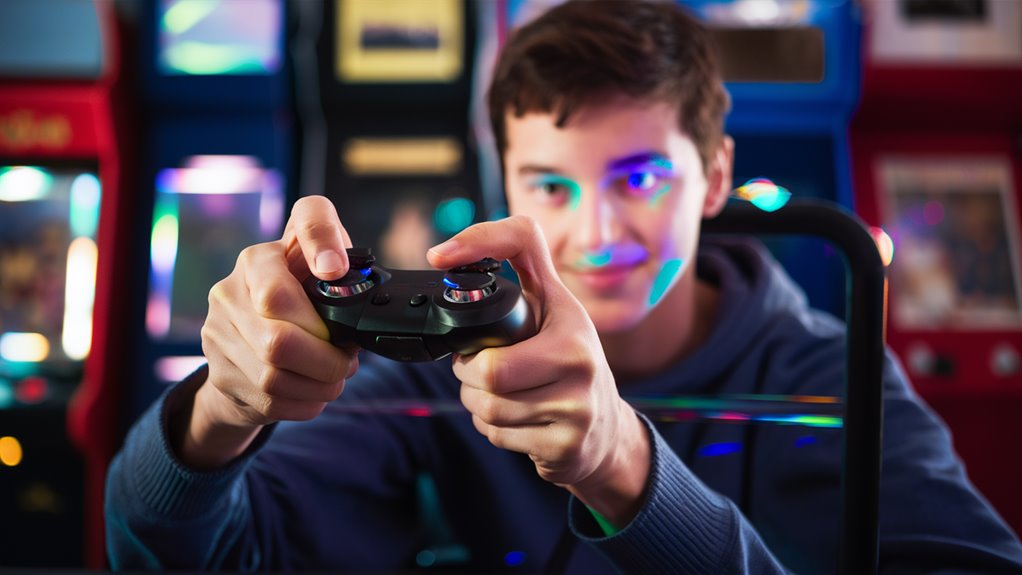
Let’s talk about how modern games are putting you in the driver’s seat when it comes to rewards. You know how frustrating it can be when everything feels random or predetermined? Well, that’s changing.
These days, you’ve got real control over what you earn through your skills and choices, which honestly makes gaming so much more fun.
Think about it like learning a musical instrument – the more you practice, the better you get, right? That’s exactly how skill-based rewards work in games now.
Maybe you want to focus on becoming a master archer, or perhaps stealth is more your style. Whatever path you choose, you can see your improvement paying off with actual rewards that match how you like to play.
What’s really cool about these systems is how clear everything is. Remember those old games where you’d open endless loot boxes hoping for something good? Pretty frustrating, right?
Now you can see exactly what you need to do to get that awesome armor or special ability you’ve been eyeing. No more crossing your fingers and hoping for the best – if you put in the work, you’ll get what you’re aiming for.
It’s kind of like having a clear roadmap to success, and who doesn’t love that?
Practice Makes Perfect Gaming
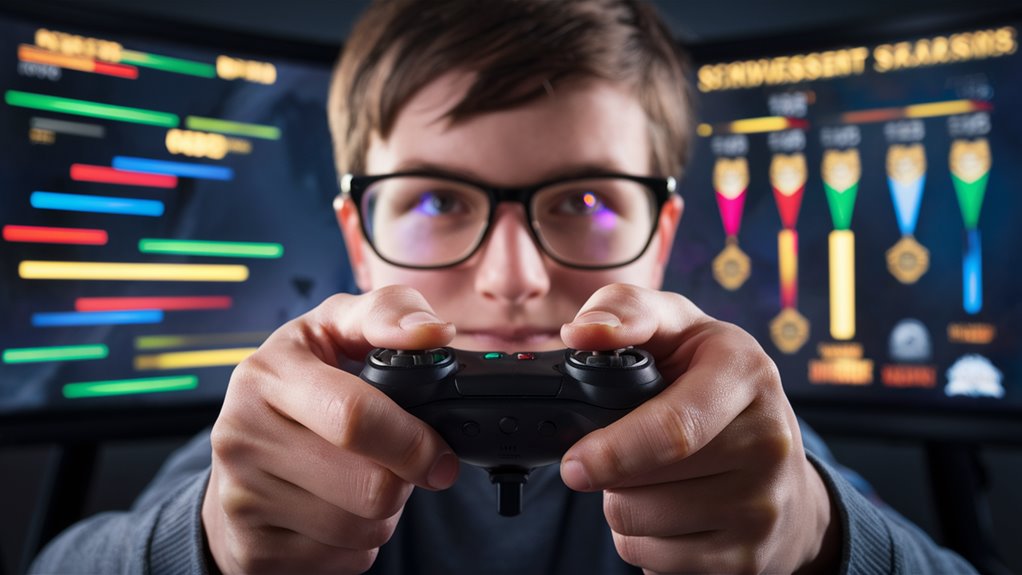
Let’s talk about how gaming skills really do improve with practice these days. You know how they say practice makes perfect? Well, it’s amazing to see young gamers taking this to heart, spending countless hours in training modes to sharpen their skills and earn those sweet in-game rewards.
Think about it – when you hop into a modern game’s practice area, you’ve got all these incredible tools at your fingertips. It’s nothing like the old days when we’d to figure everything out by trial and error.
Now you can actually see your stats improving in real-time, watch your replays to spot mistakes, and even get detailed breakdowns of your performance. Pretty cool, right?
The best part is that all this practice really pays off. Instead of mindlessly grinding for experience points, you’re building genuine skills that unlock special rewards, cooler content, and new ways to play.
Every time you nail that tricky combo or master a new technique, you’re not just getting better, you’re also earning something tangible for your efforts. It creates this really satisfying loop where putting in the work feels totally worth it, because you can see and feel the results both in your gameplay and in your rewards.
Makes you wonder why we didn’t have these kinds of training features in games years ago, doesn’t it? The way games reward skill development now just makes so much sense, and it keeps players coming back for more.
Whether you’re practicing for fun or aiming to compete, there’s always something new to learn and earn.
Common Questions
How Do Skill-Based Bonuses Affect Player Retention Compared to Random Rewards?
Let’s think about why you stick around longer in games with skill-based rewards. You know that feeling when you nail a perfect combo or master a tricky strategy? That sense of achievement keeps you coming back for more because you earned it through your own efforts. It’s like learning to play an instrument – the better you get, the more satisfying it feels.
Random rewards, while exciting at first, can actually push players away over time. Picture pulling that slot machine lever over and over, hoping for a jackpot that never comes. Pretty frustrating, right? When your success depends purely on chance, those losing streaks can really take the wind out of your sails.
That’s why many successful games nowadays blend both systems, but lean more heavily on skill-based rewards. When players see their practice and dedication pay off with meaningful bonuses, they’re more likely to stay invested. Sure, a bit of randomness can add excitement, but nothing beats the satisfaction of knowing you truly earned your rewards.
Think about it like sports – would you rather win because you practiced and improved, or just because you got lucky? For most players, the answer is pretty clear.
Can Skill-Based Gaming Systems Effectively Prevent Cheating and Exploitation?
Let’s talk about skill-based gaming systems and their battle against cheating. You know how it goes – wherever there’s competition, someone’s trying to bend the rules. While these systems have gotten pretty smart with their anti-cheating tools, they’re kind of like a really good security guard – effective most of the time, but not completely foolproof.
Think about it this way: modern gaming platforms use some impressive tech to catch potential cheaters. They’re constantly watching player patterns, analyzing performance data, and flagging anything that looks suspicious. It’s almost like having a virtual referee who never takes their eyes off the game.
But here’s the thing – determined cheaters can be pretty creative. Just as bank security keeps evolving to stop thieves, gaming systems have to keep updating their defenses against new exploitation methods. Real-time monitoring helps catch obvious cheating, like someone suddenly playing way above their skill level or using impossible moves.
The good news? These systems are getting better all the time. Between sophisticated analytics tracking unusual patterns and automated systems comparing player performance across thousands of games, it’s getting harder to get away with cheating. But let’s be honest – there’s always going to be someone trying to outsmart the system.
What Percentage of Gaming Revenue Comes From Skill-Based Versus Chance-Based Mechanics?
Let’s dive into the fascinating world of gaming revenue. You might be surprised to learn that chance-based games are still the heavy hitters in the industry. When we look at the numbers, games of chance, like slots and lottery-style mechanics, pull in a whopping 80-90% of all gaming revenue. Pretty remarkable, right?
On the flip side, skill-based games, where your abilities and practice actually make a difference, account for about 10-20% of the industry’s earnings. Think of games where you need to master complex strategies or perfect your reflexes. While these games have a dedicated following and often receive critical acclaim, they’re not quite the money-makers that their chance-based cousins are.
It’s kind of like comparing a casino to an arcade, if you think about it. Sure, people love showing off their skills at the arcade, but those slot machines and random-draw mechanics? Well, they’re still the ones bringing home the bacon in the gaming world.
Do Skill-Based Rewards Create Unhealthy Competition Among Younger Players?
Let’s talk about skill-based rewards in youth sports and gaming. You know how kids naturally want to show they’re the best? Well, it’s not always black and white when it comes to competition.
On one hand, these rewards can really light a fire under young players. Think about a kid who practices extra hard to earn that special badge or unlock that next achievement level. This kind of motivation can teach valuable lessons about dedication and self-improvement.
But here’s the thing – it can get pretty intense, especially for younger players. Picture a child who keeps comparing their progress to their friends, constantly feeling like they’re falling behind. Some kids might lose sleep over rankings or feel anxious about performing under pressure.
The real challenge is finding that sweet spot. Just like in school, where some friendly competition can make learning more fun, skill-based rewards should encourage growth without creating unnecessary stress. Maybe your child thrives on challenges, while their friend might feel overwhelmed by the same system.
How Do Developers Balance Skill Rewards Between Casual and Hardcore Gamers?
Let’s talk about how game developers walk that tricky line between keeping casual players happy while giving hardcore gamers the challenges they crave. You know how it goes – some folks just want to unwind after work with a fun game, while others live to master every single detail.
Game developers have gotten pretty clever about this balancing act. They typically set up multiple layers of rewards that work for everyone. Think of it like a swimming pool – you’ve got the shallow end where casual players can splash around and have fun, plus a deep end where the serious swimmers can really push themselves.
For your everyday player, there are usually straightforward achievements and rewards that don’t require intense grinding or perfect skills. Maybe it’s unlocking basic character outfits or getting simple milestone rewards. But here’s where it gets interesting – developers also tuck away those extra-special challenges and fancy cosmetic rewards that hardcore players love to chase. The best part? These advanced rewards look cool but don’t give any unfair advantages in the actual gameplay.
